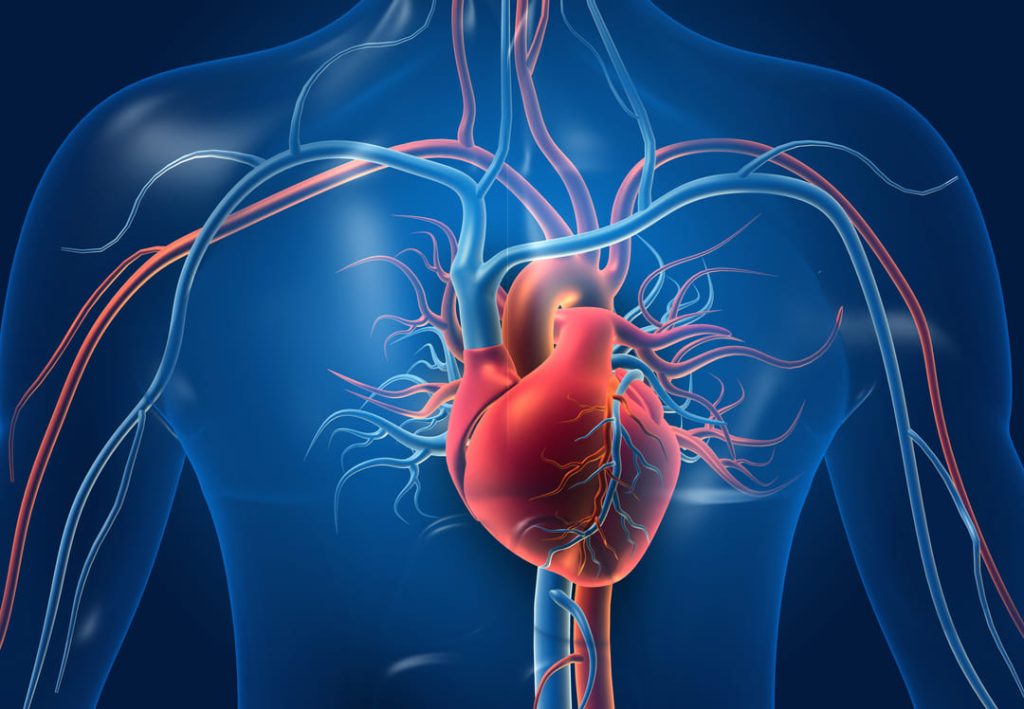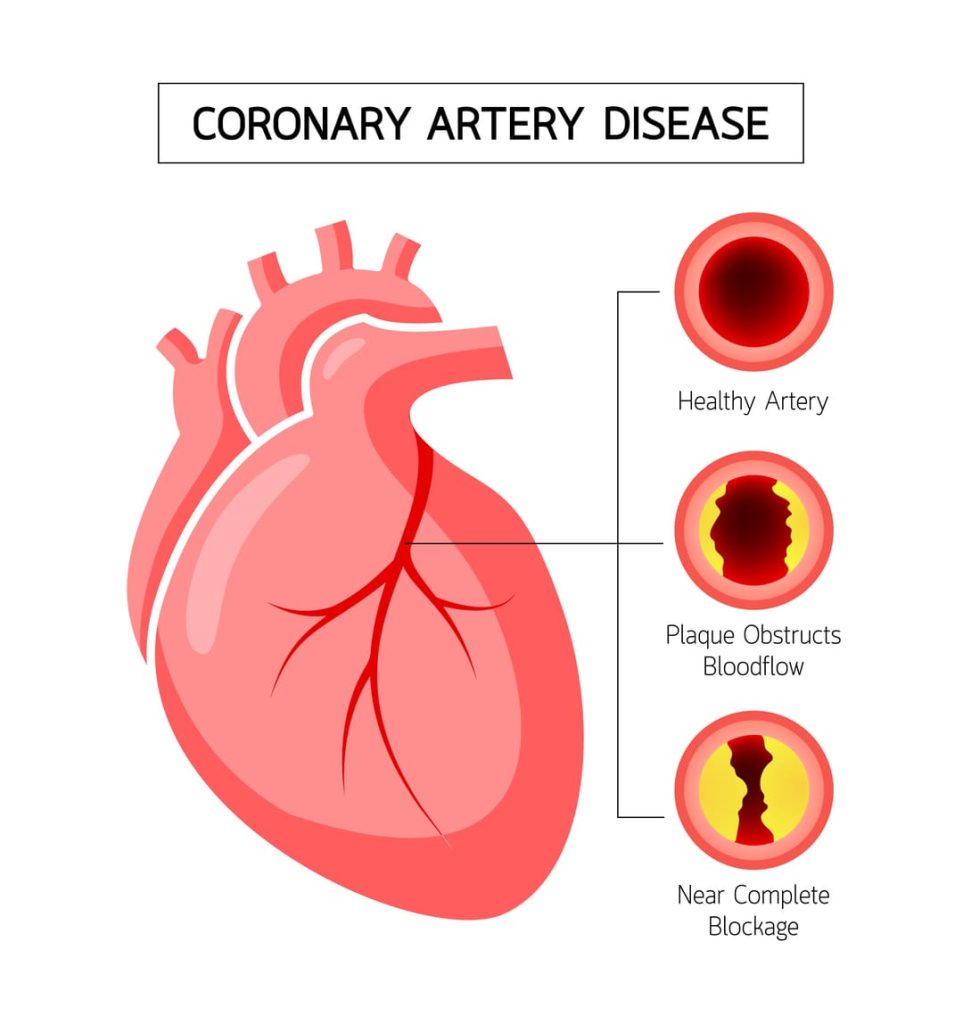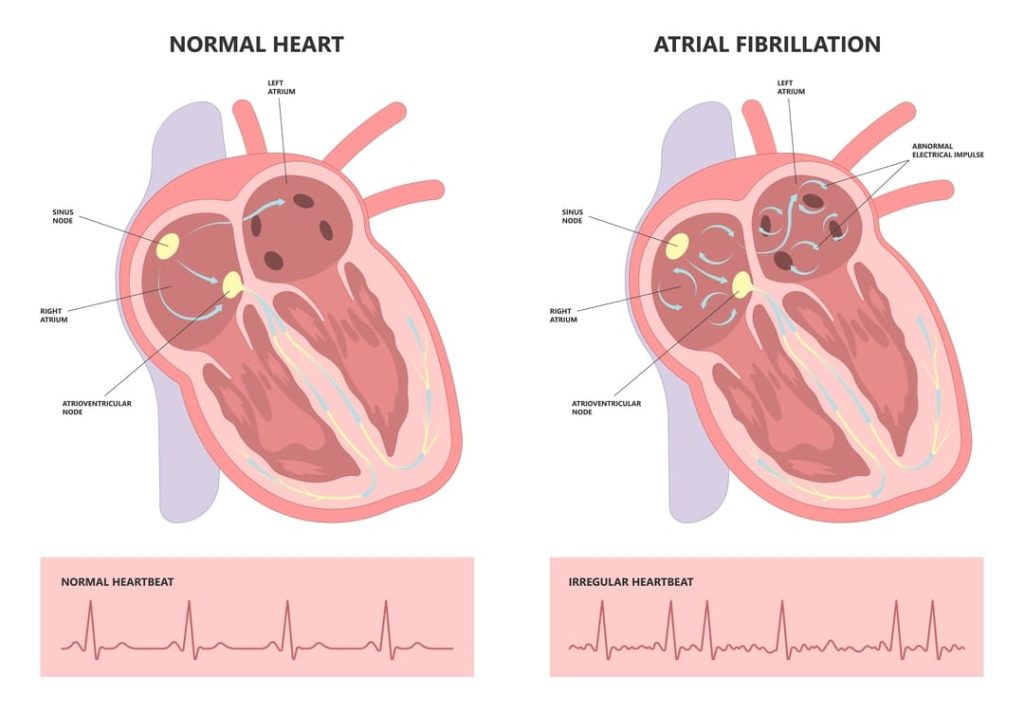Looking for Expert-Level VA Claim Answers?📱Call Us Now! 737-295-2226
This VA Disability for Heart Conditions guide details commonly-rated heart conditions and explains how to get service connected to receive the VA benefits and compensation you deserve.
Heart conditions, including heart disease, are prevalent in veterans, especially if exposed to Agent Orange or other irritants.
Let’s get started.
- VA Disability for Heart Conditions
- VA Disability Rating for Heart Arrhythmia
- Ischemic Heart Disease VA Rating
- VA Disability Rating for Atrial Fibrillation (AFIB)
- VA Disability Rating for Heart Murmur
- VA Rating for Heart Disease
- VA Disability Rating for Arteriosclerosis
- Pacemaker Effect on VA Disability Rating
- How to Service Connect Your Heart Condition
- VA C&P Exam for Heart Conditions
- VA Disability Rating for Heart Stent
- Can I Get a VA Disability Rating for Cardiac Ablation?
- Is Being on Blood Thinners a VA Disability?
- NEED MORE ASSISTANCE?

You DESERVE a HIGHER VA rating.
Take advantage of a VA Claim Discovery Call with an experienced Team Member. Learn what you’ve been missing so you can FINALLY get the disability rating and compensation you’ve earned for your service.
VA Disability for Heart Conditions
When it comes to VA disabilities for heart conditions, some of the most common veteran heart conditions include:
- Heart Arrhythmia
- Ischemic Heart Disease (also known as Coronary Artery Disease (CAD))
- Atrial Fibrillation (AFIB)
- Heart Murmur
- Heart Disease
- Arteriosclerosis
The VA uses METs testing to determine VA disability for heart conditions, and your VA rating depends on your symptoms at various exertion levels.
Each level of exercise is assigned a range of METs (or metabolic equivalents), with a higher level of exertion resulting in a high METs number.
VA Disability Rating for Heart Arrhythmia
Arrhythmia, or an abnormal heart rate, refers to a heart beating with an abnormal heart rhythm, which can be either too fast (tachycardia) or too slow (bradycardia). The VA rates heart arrhythmia at 10%, 30%, 60%, or 100%, depending on the severity, duration, and frequency of symptoms.
VA Rating Chart for Heart Arrhythmia
The VA rating for heart arrhythmia can be found under DCs 7009, 7010, and 7011. In addition, it can be rated under the general rating for heart diseases, depending on your specific symptoms.
| Description | VA Rating |
| There is continuous congestive heart failure, OR Your condition scores 3 METs or less on the MET test while causing shortness of breath, fatigue, chest pain, and dizziness, OR The left ventricle is found to be pushing out less than 30% of the blood it is meant to with each beat | 100% |
| You’ve experienced at least two episodes of congestive heart failure in the past year, OR Your condition scores 4 or 5 METs on the MET test while causing shortness of breath, fatigue, chest pain, and dizziness, OR Left ventricular dysfunction is causing an ejection rate between 30-50% | 60% |
| Your condition scores 6 or 7 METs on the MET test while causing shortness of breath, fatigue, chest pain, and dizziness, OR There is evidence of hypertrophy (thickening of the heart muscle) or dilation (an expanding of the heart) | 30% |
| Your condition scores 8, 9, or 10 METs on the MET test while causing shortness of breath, fatigue, chest pain, and dizziness, OR You have the need for continuous medication | 10% |

Ischemic Heart Disease VA Rating
Ischemic heart disease, also known as Coronary Artery Disease, occurs when the heart doesn’t get enough blood and oxygen, narrowing the coronary muscles that supply blood to the heart muscle. The VA rates Coronary Artery Disease at 10%, 30%, 60%, or 100%, depending on the severity of symptoms.
VA Rating Chart for Ischemic Heart Disease
The VA generally rates ischemic heart disease under 38 CFR § 4.104 – Schedule of Ratings, Cardiovascular System, Diagnostic Code 7005.
The VA rating for Coronary Artery Disease follows the chart below.
| Description | VA Rating |
| MET test causes symptoms (like shortness of breath, fatigue, chest pain, dizziness, heart palpitations, arrhythmia, or fainting) at 3.0 METs or less | 100% |
| MET test causes symptoms (like shortness of breath, fatigue, chest pain, dizziness, heart palpitations, arrhythmia, or fainting) at 3.1 to 5.0 METs | 60% |
| A MET test causes symptoms (like shortness of breath, fatigue, chest pain, dizziness, heart palpitations, arrhythmia, or fainting) at 5.1 to 7.0 METs, OR Evidence (echocardiogram, multigated acquisition scan, MRI, etc.) of hypertrophy or dilatation. | 30% |
| A MET test causes symptoms (like shortness of breath, fatigue, chest pain, dizziness, heart palpitations, arrhythmia, or fainting) at 7.1 to 10.0 METs, OR Continuous medication is required for control | 10% |
Conditions Secondary to Ischemic Heart Disease
- Sleep Apnea
- Heart Failure
- Arrhythmias
- Cardiomyopathies
- Valvular Heart Disease
Regarding #2-5 of the conditions secondary to IHD: While these heart conditions can be filed secondary to IHD, the VA won’t assign separate ratings. If the VA grants service connection for both conditions, they will only assign whichever condition has the higher rating.
C&P Exam for Ischemic Heart Disease
A C&P exam for Ischemic Heart Disease (IHD), also known as a stress test, is essential when establishing VA disability for heart conditions. During your C&P exam, the physician may perform METs testing on either the treadmill or stationary bike.
The doctor will measure your heart’s electrical activity and blood flow as your heart rate and blood pressure increase. The test helps determine how well your heart is pumping and how much reserve capacity it has.
A healthy heart pumps enough blood to meet the demand, while someone with ischemic heart disease has a reduced blood flow, leading to abnormal electrical activity.

VA Disability Rating for Atrial Fibrillation (AFIB)
Atrial Fibrillation (AFIB) is an irregular, rapid heartbeat, increasing your risk for heart failure, stroke, and other heart-related conditions. The VA rates AFIB at 10% or 30%, depending on the severity, duration, and frequency of your symptoms. You can find the AFIB VA Rating under Diagnostic Code 7010.
VA Rating for AFIB
| Description | VA Rating |
| If it requires intravenous pharmacologic adjustment, cardioversion, and/or ablation to relieve symptoms 5 or more times a year | 30% |
| If it requires one or more of the following: Intravenous pharmacologic adjustment, cardioversion, and/or ablation to relieve symptoms 1 to 4 times a year. Continuous use of oral medication to control symptoms Vagal maneuvers (vagus nerve stimulation) to control symptoms | 10% |
VA Disability Rating for Heart Murmur
Heart murmurs are whooshing or swishing sounds made by turbulent, rapid blood flow through the heart. While some people are born with heart murmurs, veterans are frequently diagnosed after their service. The VA rates hurt murmurs at 10%, 30%, 60%, or 100%, depending on the severity, duration, and frequency of symptoms.
A heart murmur and an arrhythmia are often confused, so here’s a quick overview of the difference:
- Heart Murmur = An extra or unusual sound in a heartbeat
- Arrhythmia = An irregular heartbeat rhythm
VA Rating Chart for Heart Murmur
| MET test causes symptoms (like shortness of breath, fatigue, chest pain, dizziness, heart palpitations, arrhythmia, or fainting) at 3.0 METs or less | 100% |
| MET test causes symptoms (like shortness of breath, fatigue, chest pain, dizziness, heart palpitations, arrhythmia, or fainting) at 3.1 to 5.0 METs | 60% |
| A MET test causes symptoms (like shortness of breath, fatigue, chest pain, dizziness, heart palpitations, arrhythmia, or fainting) at 5.1 to 7.0 METs, OR Evidence (echocardiogram, multigated acquisition scan, MRI, etc.) of hypertrophy or dilatation. | 30% |
| A MET test causes symptoms (like shortness of breath, fatigue, chest pain, dizziness, heart palpitations, arrhythmia, or fainting) at 7.1 to 10.0 METs, OR Continuous medication is required for control | 10% |
VA Rating for Heart Disease
Heart disease is a broad term for a handful of cardiovascular health conditions, with many having similar symptoms and attributes. The VA rates heart disease at 10%, 30%, 60%, or 100%, depending on the severity, duration, and frequency of symptoms.
Practical terms to know while determining your VA disability for heart conditions:
- Dyspnea: Labored or difficulty breathing
- Angina: A condition marked by severe chest pain, often spreading to the arms, shoulders, and neck
- Syncope: A temporary loss of consciousness due to a fall in blood pressure
VA Rating Chart for Heart Disease
| Description | VA Rating |
| Chronic congestive heart failure, OR The workload of 3 METs or less results in dyspnea, fatigue, angina, dizziness, or syncope, OR Left ventricular dysfunction with an ejection fraction of less than 30 percent | 100% |
| A workload of greater than 7 METs but not greater than 10 METs results in dyspnea, fatigue, angina, dizziness, or syncope, OR Continuous medication required | 60% |
| More than one episode of acute congestive heart failure in the past year, OR A workload of greater than 3 METs but not greater than 5 METs results in dyspnea, fatigue, angina, dizziness, or syncope, OR Left ventricular dysfunction with an ejection fraction of 30 to 50 percent | 30% |
| The workload of greater than 7 METs but not greater than 10 METs results in dyspnea, fatigue, angina, dizziness, or syncope, OR Continuous medication required | 10% |
VA Disability Rating for Arteriosclerosis
The VA rates arteriosclerosis at 10%, 30%, 60%, or 100%, depending on the severity, duration, and frequency of symptoms.
Generally, coronary artery disease is caused by arteriosclerosis, as a buildup of plaque (fatty deposits) and cholesterol forms in your arteries. Military conditions make you more likely to develop arteriosclerosis because of the sometimes sedentary lifestyle in a high-stress environment.
VA Rating Chart for Arteriosclerosis
| Description | VA Rating |
| MET test causes symptoms (like shortness of breath, fatigue, chest pain, dizziness, heart palpitations, arrhythmia, or fainting) at 3.0 METs or less | 100% |
| MET test causes symptoms (like shortness of breath, fatigue, chest pain, dizziness, heart palpitations, arrhythmia, or fainting) at 3.1 to 5.0 METs | 60% |
| A MET test causes symptoms (like shortness of breath, fatigue, chest pain, dizziness, heart palpitations, arrhythmia, or fainting) at 5.1 to 7.0 METs, OR Evidence (echocardiogram, multigated acquisition scan, MRI, etc.) of hypertrophy or dilatation. | 30% |
| A MET test causes symptoms (like shortness of breath, fatigue, chest pain, dizziness, heart palpitations, arrhythmia, or fainting) at 7.1 to 10.0 METs, OR Continuous medication is required for control | 10% |
Pacemaker Effect on VA Disability Rating
Pacemakers are small electronic devices that regulate your heartbeat.
The VA rates pacemaker surgery under diagnostic code (DC) 7018 “Implantable cardiac pacemakers.”
Under DC 7018, you could get a temporary 100% disability rating for one month following discharge from the hospital for your pacemaker implantation surgery. Once that initial month is up, the VA will reevaluate your condition under DC 7010, 7011, or 7015 and will assign you a rating of 10% at a minimum.
DC 7010 is for Supraventricular Tachycardia. The rating for DC 7010 is either 30% or 10%.
- 30%: Your condition is confirmed by ECG and requires 5 or more treatment interventions per year.
- 10%: Your condition is confirmed by ECG and requires 1 to 4 treatment interventions per year.
Or, your condition is confirmed by ECG and is managed with either continuous use of oral medications or vagal maneuvers.
DC 7011 is for sustained Ventricular arrhythmias and is rated at 100%.
You can qualify for a rating under DC 7011 as long as you’re receiving treatment for your arrhythmias or for as long as an implantable defibrillator is in place. You qualify starting when you were admitted to the hospital for treatment.
Six months following your discharge from the hospital, the VA will order an exam and will reevaluate your rating based on surgery residuals. Residuals is another word for anything that still needs healing from surgery.
DC 7015 is for Atrioventricular block and is evaluated under the General Rating Formula. That means your symptoms will be individually evaluated and assigned a rating percentage if they qualify for one.
For example, if an Atrioventricular block causes fatigue, you could be evaluated for a Chronic Fatigue Syndrome VA rating under DC 6354.
How to Service Connect Your Heart Condition
To receive VA disability for heart conditions, you must meet the elements of a service connection.
The 3 Elements Needed to Service Connect Your Heart Condition
- A Current diagnosis
- Evidence of an in-service event, injury, illness, or aggravation
- A nexus, or link, between the first two via competent medical evidence
Three Types of Service Connections
- Direct Service Connection: You can prove a current diagnosis of your condition, an in-service illness or event, and a medical nexus linking your diagnosis to your military service.
- Secondary Service Connection: A condition caused or worsened by a primary service-connected condition.
- Presumptive Connection: You served in a time or place that exposed you to hazardous chemicals or environments, like Agent Orange.
VA C&P Exam for Heart Conditions
To receive proper VA disability for heart conditions, you may be required to attend a C&P exam. During the exam, the doctor will have you perform specific exercises to determine how your heart is functioning and its ability to provide oxygen during exercise.
If the results show evidence of a heart condition, you will receive a VA rating between 10%-100%. Your C&P exam determines your appropriate VA rating, so ensure you don’t miss your scheduled appointment.
Check out our Top 7 Tips to Prepare for Your VA C&P Exam before your appointment.
VA Disability Rating for Heart Stent
Unfortunately, there is no VA disability rating for heart stent placement itself.
However, there are heart conditions that can require stent placement that you can get a VA rating for, such as Ischemic Heart Disease (DC 7005) and Myocardial Infarction (aka heart attack) (DC 7006).
Stents are tiny, expandable mesh coils that keep arteries from narrowing or closing. They’re often associated with angioplasties, which is a procedure used to improve blood flow to the heart. However, stents can be placed in non-coronary arteries as well.
When placing a stent, the surgeon will typically insert a long tube with a small balloon on the tip into the clogged artery. Then, the balloon is inflated to expand the arteries at the clogged area to improve blood flow. The surgeon then places the stent to keep the artery expanded.
Can I Get a VA Disability Rating for Cardiac Ablation?
No, there is no VA disability rating for cardiac ablation.
Cardiac ablation can’t be rated by the VA because it is a medical procedure, not a disability.
Cardiac ablation is a procedure that helps restore your heartbeat to a normal rhythm. During the procedure, the surgeon uses hot and cold energy to block bad electrical signals from reaching the heart. These bad signals are what cause abnormal heartbeats, so blocking them helps treat arrhythmia. Cardiac ablations are usually conducted during open heart surgery.
Because of their long recovery times, it’s possible for you to get a temporary VA disability rating for a cardiac ablation. This is called a convalescence rating.
Convalescence ratings are temporary 100% ratings that can be awarded to Veterans who can’t work while they recover from surgery on a service-connected disability.
Surgery Requirements for a Convalescence Rating
To be eligible for a convalescence rating, your cardiac ablation surgery must result in one of the following:
- A convalescence (recovery) period of at least one month
- Severe postoperative conditions like:
- Incompletely healed surgical wounds, stumps of recent amputations
- Therapeutic immobilization of one major joint or more
- A body cast
- The necessity for house confinement
- The necessity for continued use of a wheelchair or crutches
Applying for a Convalescence Rating
Two things can trigger a temporary 100% VA disability convalescence rating:
- You submit a claim
- The VA receives a report of your hospitalization. This report is automatically generated and reviewed by the VA.
It’s a good idea to be proactive and apply for a convalescence rating before you need it. Ask your doctor if your treatment will result in any of the eligibility criteria discussed above.
If it will, submit a claim for a convalescence rating before receiving treatment.
Is Being on Blood Thinners a VA Disability?
No, there is no VA disability rating for being on blood thinners.
Being on blood thinners can’t be a VA disability because it isn’t a diagnosable condition. There is no disease called “being on blood thinners.” Rather, blood thinners are a type of medication used to treat blood issues, known as anticoagulants.
As the name says, they thin out the blood to help prevent blood clots.
Blood thinners are typically prescribed to patients who have suffered or are at risk of conditions like:
- Heart attack
- Stroke
- Deep Vein Thrombosis
- Pulmonary Embolism

NEED MORE ASSISTANCE?
Most veterans are underrated for their disabilities and, therefore, not getting their due compensation. At VA Claims Insider, we help you understand and take control of the claims process, so you can get the rating and compensation you’re owed by law.
Our process takes the guesswork out of filing a VA disability claim and supports you every step of the way in building a fully-developed claim (FDC)—so you can increase your rating FAST!
If you’ve filed your VA disability claim and have been denied or have received a low rating—or you’re unsure how to get started—reach out to us! Take advantage of a FREE VA Claim Discovery Call. Learn what you’ve been missing—so you can FINALLY get the disability rating and compensation YOU DESERVE!




